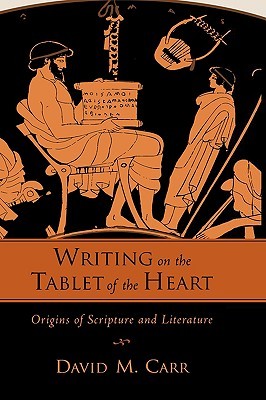
- We will send in 10–14 business days.
- Author: David M Carr
- Publisher: Oxford University Press, USA
- ISBN-10: 0195382420
- ISBN-13: 9780195382426
- Format: 15.6 x 23.4 x 1.8 cm, softcover
- Language: English
- SAVE -10% with code: EXTRA
Writing on the Tablet of the Heart Origins of Scripture and Literature (e-book) (used book) | bookbook.eu
Reviews
Description
This book explores a new model for the production, revision, and reception of Biblical texts as Scripture. Building on recent studies of the oralDSwritten interface in medieval, Greco-Roman and ancient Near Eastern contexts, David Carr argues that in ancient Israel Biblical texts and other texts emerged as a support for an educational process in which written and oral dimensions were integrally intertwined. The point was not incising and reading texts on parchment or papyrus. The point was to enculturate ancient Israelites -- particularly Israelite elites -- by training them to memorize and recite a wide range of traditional literature that was seen as the cultural bedrock of the people: narrative, prophecy, prayer, and wisdom. Generally, mastery was exercised through remarkably exact recall and reproduction of the tradition -- whether through oral performance or through production of written "performances." Crises like exile, however, could prompt the creation of radically new
versions of the classic tradition, incorporating verbal recall of ancient tradition with various extensions, recontextualizations and supplements. This educational process took place on a one-to-one basis and focused on the cultivation of an educated elite. A major change took place with the arrival of the Hellenistic empires in the fourth and following centuries. This, says Carr, led to the emergence of a democratized Jewish "school" as well as the marking off of the standard Israelite texts as an "anti-canon" to the Hellenistic canon of educational texts that were used in the Greek schools of the Eastern Mediterranean.
EXTRA 10 % discount with code: EXTRA
The promotion ends in 20d.18:00:26
The discount code is valid when purchasing from 10 €. Discounts do not stack.
- Author: David M Carr
- Publisher: Oxford University Press, USA
- ISBN-10: 0195382420
- ISBN-13: 9780195382426
- Format: 15.6 x 23.4 x 1.8 cm, softcover
- Language: English English
This book explores a new model for the production, revision, and reception of Biblical texts as Scripture. Building on recent studies of the oralDSwritten interface in medieval, Greco-Roman and ancient Near Eastern contexts, David Carr argues that in ancient Israel Biblical texts and other texts emerged as a support for an educational process in which written and oral dimensions were integrally intertwined. The point was not incising and reading texts on parchment or papyrus. The point was to enculturate ancient Israelites -- particularly Israelite elites -- by training them to memorize and recite a wide range of traditional literature that was seen as the cultural bedrock of the people: narrative, prophecy, prayer, and wisdom. Generally, mastery was exercised through remarkably exact recall and reproduction of the tradition -- whether through oral performance or through production of written "performances." Crises like exile, however, could prompt the creation of radically new
versions of the classic tradition, incorporating verbal recall of ancient tradition with various extensions, recontextualizations and supplements. This educational process took place on a one-to-one basis and focused on the cultivation of an educated elite. A major change took place with the arrival of the Hellenistic empires in the fourth and following centuries. This, says Carr, led to the emergence of a democratized Jewish "school" as well as the marking off of the standard Israelite texts as an "anti-canon" to the Hellenistic canon of educational texts that were used in the Greek schools of the Eastern Mediterranean.


Reviews